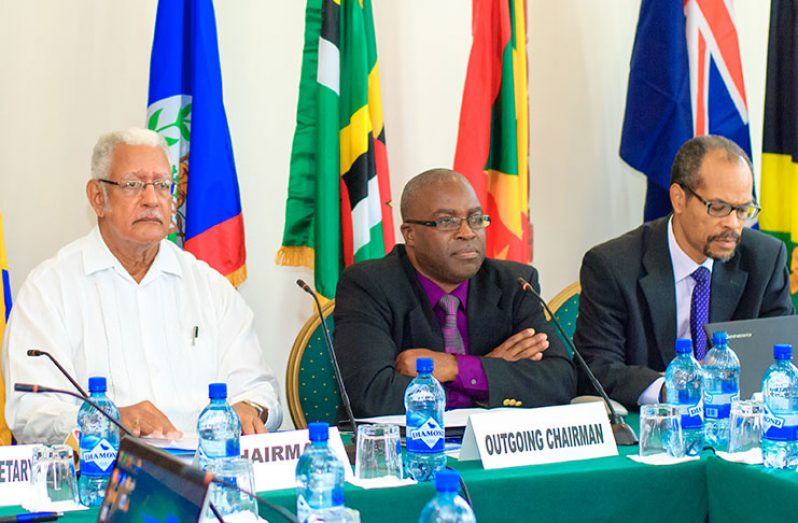-CRFM reviewing ways to create sustainable fisheries industry
ILLEGAL, Unreported and Unregulated (IUU) fishing continues to be a problem for the Caribbean’s fishing industry, resulting in millions of dollars in losses annually.
The issue was highlighted by Chief Technical Director in the Ministry of Agriculture and Fisheries of Jamaica, Dermon Spence, when he addressed delegates at the 11th meeting of the ministerial council of the Caribbean Regional Fisheries Mechanism (CRFM) being held at Pegasus on Friday.
Spence was representing the outgoing Chairman of the CRFM, Minister of Industry, Commerce, Agriculture and Fisheries of Jamaica, Karl Samuda. Ministers from around the Caribbean were informed that Jamaica’s Fisheries Industry alone is losing on average USD$11- $12 million annually.
Persons who engage in IUU fishing, particularly foreigners, continue to undermine the efforts to regulate the fisheries industry, lamented Spence. The acknowledgement of positive steps in eradicating IUU fishing did not go unnoticed however Executive Director of CRFM, Millington Haughton said that proper conservation and management factors are needed to eradicate the illegalities.
CRFM was established 15 years ago to challenge the situation and has since been able to make significant strides in a lot of areas but there are still “current threats” that are affecting the regulations. The Caribbean Common Fisheries Policy (CCFP) has sought to counter those threats by fostering harmonisation across the Caribbean, when it comes to sustainable management and development of the Region’s fisheries and aquaculture resources, with special emphasis on promoting the most efficient use of shared resources, while aiming to improve food security and reducing poverty in the Region.
Minister of Agriculture, Noel Holder, who was dubbed the new Chairman of the CRFM said that the fisheries sector represents a very important economic activity for all countries. In the Caribbean Community (CARICOM) it contributes approximately US$40M to the Gross Domestic Product (GDP) and employs over 341,000 persons directly and indirectly.
And, in order to boost the sector the CRFM will deliberate on the progress of technical activities within the sector; seek guidance on the way forward; address matters which include effective management; address the adaptation to climate change and fisheries; and strengthen partnership with donors among other issues.
The body will also deliberate on the findings and recommendation from the 15th meeting of the Caribbean Fisheries Forum (CFF) held in Jamaica last March. Holder pointed out that they have been continuously working to develop the sector’s capacity in the areas of strategic policy, marketing, research and innovation.
“As a CARICOM family we must be united and not only seek to find solutions to ensure our survival but to mark our place in the global village…small economies like ours simply cannot survive in isolation and even though a majority of us are small islands and developing states situated in low lying coastal areas,” said the minister.
It was pointed out that with a maritime area larger than the land mass the Caribbean has resources that are of massive potential, once utilised sustainably they can benefit from it for generations to come. It contributes to food nutrition and security to rural development. In Guyana fisheries contribute about 12 percent to the agriculture GDP. Guyana harvests about 42,999 metric tonnes of seafood and it adds US$78M to the foreign currency earnings through the export of seafood. The industry also employs over 15,000 people.
“Having such an important place in our economies, we recognise the challenges such as Illegal, Unreported and Unregulated (IUU) fishing and we have taken the step to accede to the agreement on Port state measures of the Food and Agriculture Organisation of the United Nations (FAO),” Holder said.
He said the Ministry of Agriculture continues to work with fisherfolk to ensure that sustainable fishing is practised. To this end, Guyana has installed vessel-monitoring systems on the trawling fleet and has the standard turtle excluder devices and by-catch reduction devices together with a harvest-control rule. All these measures would ensure that we fish sustainably, said Holder.
As they seek to further develop marine fisheries resources, there is need to increase investment in aquaculture, therefore support to the sustainable development of aquaculture for both private and public sector personnel, must be forthcoming. There are however serious constraints to consider, including the high cost of inputs; the need to research new species for aquaculture; and market access.
“It must be noted that we are not the sole users of the marine resources and to avoid conflicts and to live in harmony with other users, it is important that more collaboration takes place at the regional and national levels between fisheries and environment and habitat, and the conversation and sustainable use of marine species. Strengthening of linkages between the fisheries and tourism sectors in the region could produce significant economic benefits for local fishers and their communities and this is something that we need to devote more effort and resources to make a reality,” Minister Holder pointed out.
It was noted that greater participation is needed in national social security, health care, insurance and other similar programmes as a means of ensuring sustainability of their livelihoods and reducing their risk, especially in light of our vulnerability to climate change.
Holder mentioned that there is need for support for every effort in the implementation of sustainable development goal 14; to conserve and sustainably use the oceans, seas and marine resources for sustainable development.





.jpg)








